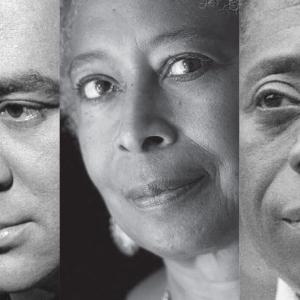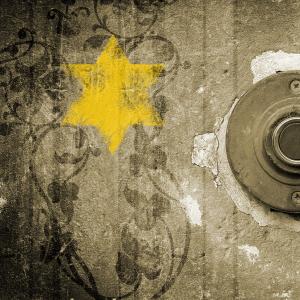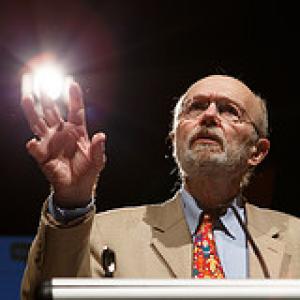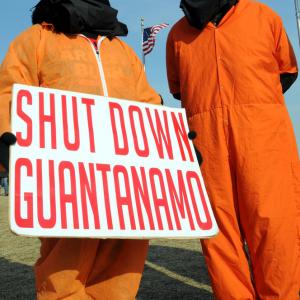
David P. Gushee is Distinguished University Professor of Christian Ethics and director of the Center for Theology and Public Life at Mercer University in Atlanta. Follow him on Twitter: @dpgushee.
Posts By This Author
White American Christianity Is Rooted in Colonial Empire-Building
There was no original innocence; the heresy of white supremacy and its resulting sins were there from the beginning.
“WHITE CHRISTIANITY IN America was born in heresy.”
This statement was made by Yale University theologian Eboni Marshall Turman last year before a large gathering of religion scholars. Marshall Turman, a formidable leader in African American theology, did not explain her meaning. In that room, she did not need to do so.
But as I heard her, I thought dolefully about how very long it took me as a white American Christian ethicist to be ready to engage or even to understand such a statement. I wondered doubtfully how many white American Christians today would be prepared to discuss it rationally. After all, part of what is so deeply wrong with white evangelicalism has to do with race. If what comes “after evangelicalism” does not address our racism at its roots, we shouldn’t bother.
To say that white Christianity in America was born in heresy is to make a theological statement about racism prior to any moral evaluation. It is to suggest that our local racism problem is ultimately rooted in heresy, a violation of central tenets of Christian doctrine. It is also to say that this heresy was present from the birth of American Christianity. There was no original innocence—the heresy and its resulting sins were there from the beginning.
This begs the question of whether the ultimate historical source of such heresy can be identified. It seems to me that a compelling starting point is 15th century Europe as it began conquering and colonizing the world in the name of Christ. The story begins with those first imperial powers, Spain and Portugal, but soon after extends to Britain and other European colonial nations, including Holland, France, Belgium, and so on. These were empire-building nations on the cusp of their grand adventures. They confidently believed themselves to be the center of the world, superior to all other cultures, entitled to conquer and colonize, and in doing so actively advancing God’s will. The European powers believed this for many centuries. Some would say that they, and their descendants, believe it still.
Reading the Classics May Save White Souls
Nine works of literature by black authors reveal the character of white Christian racism.
TO UNDERSTAND THE TRUMP PHENOMENON, which is at least in large part about race, I decided to read. Instead of reading more white people wrestling with what has gone wrong with white people, I, a white man, focused on African-American sources, mainly novels.
This move was first suggested to me by womanist ethicist Katie Cannon, who read the novelist Zora Neale Hurston as a primary source. I, too, began with Hurston, and then couldn’t stop. For two years, I have been reading classic novels by African-American authors, seeking an answer to these questions: How do black characters experience white people? How do they describe white Christian people’s morality and religion? The answers are clear—and devastating.
The Trump Prophecy
Is the Religious Right giving up on democracy?
I REMEMBER THE EXACT DAY I discovered that some conservative Christians are not all that into democracy. It was 20 years ago. My daughter asked me for help with her social studies homework. I discovered that her Christian school taught a neo-Puritan civics curriculum, which proclaimed that God’s design for human government is rule by “godly Christian men” applying scripture under the sovereignty of God. I was shocked.
In the Trump era, we again witness a conservative Christian flirtation with authoritarianism. These conservative Christians compare Donald Trump to Cyrus of Persia—both authoritarian rulers, both “friendly” to but not part of God’s people, both supposedly used by God—and Trump is lauded as the president of divine providence in shlock films such as Liberty U.’s The Trump Prophecy.
Meanwhile, a quote attributed to Russian Orthodox priest and monarchist St. John of Kronstadt that “in hell there is democracy, in heaven there is a kingdom” is making the rounds on social media, occasioning much comment leaning in the direction of authoritarian rule. John of Kronstadt died in 1908 before the Russian revolution and likely associated democratic tendencies with atheism.
Escaping The Bonds Of Privilege
"Solidarity Ethics: Transformation in a Globalized World," Fortress Press
REBECCA TODD PETERS offers here a concise treatment of the major moral concern of a large part of Christian social ethics: the structures of globalized economic life and their manifest injustices and unsustainability. She also offers a moral framework to guide the thinking of unjustly, and often blindly, privileged First World Christians about the moral situation in which we find ourselves.
She proposes concrete action guides for how such First World Christians can gradually and intentionally empty ourselves of these privileges in order to stand in solidarity with those whose lives are harmed in the delivery of our advantages. In the end what emerges is a kind of liberation ethics for those who didn’t know they needed to be liberated—in this case, from their own advantages.
Disputable Matters
Five books that are changing the evangelical discussion about LGBT Christians and the church
EVANGELICAL CHRISTIANITY has changed significantly over the last 40 years on issues of gender, race, and nation. But until now it has not changed on homosexuality. Until the last five years, any self-identified evangelical Christian (in the United States, at least) suggesting that Christians might need to change some aspect of their teaching about same-sex-oriented people and their relationships has been (metaphorically, so far) banished by the evangelical community.
But that reality has begun to shift. Five books, all published in 2013-14, represent the newest wave of U.S. evangelical reflection on LGBT matters. Evangelical New Testament scholar James Brownson published Bible, Gender, Sexuality in February 2013. Vineyard pastor Ken Wilson unveiled A Letter to My Congregation in February 2014; Matthew Vines posted God and the Gay Christian last April; Wendy VanderWal-Gritter’s Generous Spaciousness came out in May; and evangelical Presbyterian Mark Achtemeier released The Bible’s Yes to Same-Sex Marriage in June. And my own Changing Our Mind came out in October.
Brownson’s work reveals that at least some of those who tackle questions about LGBT people and evangelical Christianity are scaling the great mountain of biblical scholarship and related literature on sexuality. In an early chapter he takes on in a broad way “traditionalist” Christian scholarship, notably in the work of Robert Gagnon, a mainline conservative at Pittsburgh Seminary. Gagnon’s primary claim is that the Bible’s consistent message about sex reveals a God-given design in creation (Genesis 1-2) involving physical/biological sexual complementarity between male and female. Gagnon argues that this creation theme underlies Paul’s condemnation in Romans 1:24-27 as well.
Tackling the Hard Questions
It's time for Bible-believing Christians to take a new look at what scripture teaches us about gays and lesbians—and what it means to be a faithful church.
YOU CAN'T TURN AROUND these days in Christian circles without bumping into questions around gays and lesbians and the church. It has become the hottest of all hot potatoes in evangelical Christianity, as it has in much of U.S. and global culture.
Long-term consensus evangelical positions and practices on various aspects of “the gay issue” are being challenged at every turn. Indeed, some have already given way.
It used to be that anyone with same-sex desires was considered willfully perverse; but now many evangelicals acknowledge the clinically/medically recognized category of same-sex attraction (SSA), or sexual orientation, as a mysterious but globally recurring pattern among 3 to 5 percent of the human family.
It used to be that LGBT people were frequent targets of derogatory preaching and teaching, often so fierce that some church folks were motivated in the direction of hatred, contempt, and bullying; but now more and more preachers and teachers are moderating their language so as not to do harm.
It used to be that evangelicals sent those with SSA off to “reparative” or “ex-gay” therapies; but now those harmful and futile “treatments” have been discredited and are fading fast, as evidenced for example by Exodus International’s closure and apology in 2013 and its leader Alan Chambers’ statement that “99.9 percent” of the people they had tried to help had not experienced a change in their sexual orientation. More evangelicals are recognizing the importance of not harming their own gay and lesbian adolescents and family members. Family acceptance and suicide prevention are becoming important concerns.
The Stubborn Persistence of 'Jew-Hatred'
The term "anti-Semitism" hides an ugly history of racialized animus.
THE SHOOTINGS THAT took three lives this spring at a Jewish community center and retirement complex in Kansas are a reminder that deadly strains of what is usually called “anti-Semitism” remain with us. The fact that the shooter was a deranged white supremacist should not prevent us from coming to terms with the roots and survival of Jew-hatred in our culture.
Anti-Semitism is a made-up word that itself gives clues to the history of Jew-hatred in our civilization. The term was coined by German journalist Wilhelm Marr in 1879, one of a number of Jew-haters who were turning longstanding European Christian hatred of Jews into something modern and racial. The “Jewish problem,” therefore, became the “fact” that there was a racial group, the “Semites,” who were a mortal threat to another racial group, the “Aryans,” and therefore needed to be removed from Aryan societies. All right-thinking Germans/Europeans/Aryans, the argument went, needed to unite to combat the Semites through a scientific antisemitismus. The term is usually written “anti-Semitism” in English, but that usage profoundly reinforces the racist myth that there is a race of “Semites” needing to be opposed by “anti-Semites.” The term Jew-hatred is better because it refuses to participate in this mythology.
Modern racialized Jew-hatred flowed into the 20th century and crystallized most disastrously in Nazi Germany. There, over 12 terrible years, the 19th century anti-Jewish program was enacted, and then exceeded. Jews were to be “eliminated” from among the “Aryans,” a program that became annihilation after 1939, with 6 million Jews murdered.
A Tribute to Glen Stassen
Editor's Note: This piece originally appeared at ABPNews/Herald HERE.
My friend Glen Stassen died today (Saturday, April 26) in Pasadena. He was 78. But because he was born on Leap Day — February 29, 1936 — Glen liked to joke that he was only 19. Until an aggressive cancer took his vitality over the last year, and finally his life, Glen as 78-going-on-19 was totally believable. It is impossible to believe that he has gone to be with Jesus.
There are only a small number of people beyond family who deeply affect the course of one’s life. Glen Stassen was one such person for me, perhaps the primary person outside my family who shaped who I am and what I have become. Having him gone makes me feel like an orphan.
In the Name of Security
How the U.S. became a torturing nation—and how to make it stop
THE SAD RECORD of human history shows that torture has more often been the rule rather than the exception—in criminal justice systems as well as in interethnic, intercommunal, and international conflicts.
The use of torture in such situations—and brutalities that might fall short of torture but are nonetheless brutalities—can have many motivations. Torture demonstrates absolute power. Torture wreaks vengeance. Torture intimidates. Torture punishes. Torture coerces behavior change. Torture harms, and sometimes the sheer (perverted) pleasure of doing harm is enough motivation. And yes, torture is sometimes deployed to elicit information, confession, or “actionable intelligence.” (This was the main ostensible reason why the U.S. tortured after 9/11. But other factors on this list should not be overlooked.)
Torture appears to come all too naturally to fallen humanity. That is a still quite useful theological term that conveys the belief that humanity was created good by a good God but has fallen into sin and thus has suffered disastrous individual and collective damage to its character. Fallen human beings and human communities resort easily to torture.
So one way to talk about the ethics of torture and brutality is to start exactly here—with the historically and theologically grounded claim that torture has more often been the rule rather than the exception in human history, a dark but pervasive aspect of the behavior of fallen humanity. But what if we turn the discussion of torture upside down in what might be a constructive way?
Toward Life Abundant
"Resisting Structural Evil: Love as Ecological-Economic Vocation"
CYNTHIA MOE-LOBEDA is a Lutheran feminist ethicist trained at Union Theological Seminary in New York who teaches Christian ethics, gender, and diversity studies at Seattle University. The author of several previous books in Christian social ethics, she has emerged as a significant voice in contemporary Christian economic, ecological, and public ethics.
The evil considered in Resisting Structural Evil is primarily the collective ecological and economic damage being done by wealthy global North folk—such as most readers of this review—through the indulgent and wasteful way of life that we have been socialized into accepting as normal despite its disastrous implications and effects. This evil is structural and driven largely by the unaccountable and nearly unlimited power of the modern corporation.
One reason our ecological and economic injustice can be labeled as evil is because it is largely hidden from our eyes—or if we see it, it is accepted as simply the way things are and always have been and always will be. So we live off the suffering of the people whose land we take or despoil, or whose livelihoods we destroy, or whose water we poison, or whose labor we exploit to get our “everyday low prices.” And we go merrily about our wealthy and comfortable way in a state of what the author describes as “moral oblivion.”
Moe-Lobeda takes the reader on a journey intended to end such moral oblivion. I find the book to be primarily an exposé of the connections between the “American way of life” and the injustices on which it is built—and which it perpetuates. Among these injustices is harm to the earth, which has both terrifying long-term implications for the livability of our planet in the future and concrete short-term costs for those invisible neighbors of ours who suffer ecological harm so that we might drink our soft drinks and get the latest electronics.
Mr. Obama, Close Down This Jail!
Guantanamo reminds us of the fragility of constitutional democracy.
PUBLIC PRESSURE IS finally building on President Obama to fulfill his promise to close the Guantanamo prison, which still houses 166 miserable leftovers from the Bush-Cheney “war on terror.” That pressure is well-placed. Gitmo has been a disaster from the beginning. Christians and other people of faith must join in calling for its closure.
Detainees were originally shipped to Gitmo in the vain hope of avoiding the reach of the U.S. judiciary. In this sense Gitmo was conceived in Constitution-evading sin. The Supreme Court rejected the evasion in 2006, but the damage was already done.
Some of the detainees brought to Gitmo were tortured. This has been confirmed by numerous sources, including a leaked 2006 Red Cross report and the 577-page report of a bipartisan blue-ribbon detainee panel organized by The Constitution Project, on which I served.
More than half of the remaining detainees have been cleared for release, but for domestic and geopolitical reasons they continue to be held. More than 100 of them are currently on a hunger strike, with dozens being force-fed, a practice that violates both American Medical Association and World Medical Association standards and which our Detainee Task Force condemned unequivocally.
Some detainees cannot be tried because the evidence against them was obtained by brutal or torturous means and is tainted or would be embarrassing to the U.S. Others are slated for trials in novel military commissions whose legal problems are so severe that they have not proceeded. Civilian trials on U.S. soil were blocked in 2009 by a fearful, recalcitrant Congress. So 166 men are held in limbo indefinitely, without trial and without foreseeable prospect of release. This is unconstitutional and a violation of the most basic legal and human rights.
The U.S. Warfare State and Evangelical Peacemaking
Evangelicals are gearing up to be makers of peace. Are they ready for the serious responsibilities that entails?
AMID THE COUNTRY'S serious fiscal problems, our $775 billion annual defense budget, not to mention our tens of billions of dollars spent on intelligence and other national security expenses, is treated as sacrosanct. Budget-cutters, especially on the Republican side, do not train their sights on the defense budget as they seek to address our flood of red ink, but instead focus on dramatic cuts in the safety net for the poor.
According to former Reagan budget director David Stockman, our $775 billion defense budget is nearly twice as large in inflation-adjusted dollars as the defense budget of Dwight Eisenhower for 1961, during the Cold War. Our FY 2011 defense budget was five times greater than that of China, our nearest competition for this dubious honor; constituted over 40 percent of the world’s entire military spending; and was larger than the cumulative budget of the next 14 nations in the top 15. All of this occurs at a time when our infrastructure is crumbling, our schools are sliding, and one-sixth of our population cannot find or has stopped looking for full-time work.
Stockman suggests that no plausible national defense goals today justify this level of defense spending. He rightly points out that “we have no advanced industrial state enemies” akin to the USSR of Cold War days. He argues that what in fact supports a budget of this size is an ideology of “neoconservative imperialism” and an attempt to function as a “global policeman” even after the world has “fired” us from this role.
In Pursuit of the Common Good
What does individualism have to do with Christianity? Not much.






